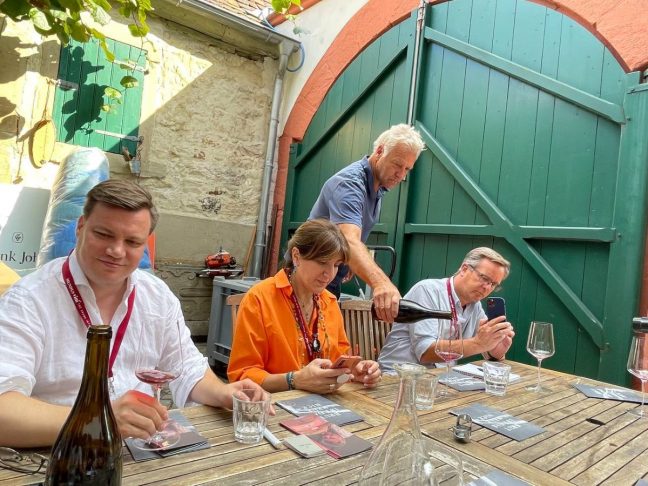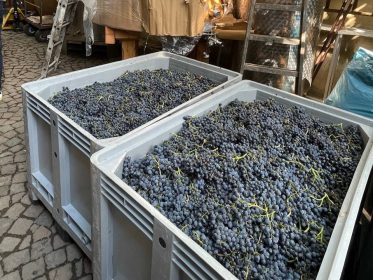Mundus Vini pre-release tasting at Frank John – Das Hirschhorner Weinkontor
If the mountain won’t come to Muhammad, then Muhammad must come to the mountain, says an old Ottoman proverb. The Mundus Vini Summer Tasting 2022, traditionally held in the cosy, antique and historical town of Neustadt an der Weinstraße, coincided with the grape harvesting in Rheinland-Pfalz, so not all winemakers were able to participate in the event. That is why the team of Mundus Vini tasters decided to visit Frank John – Das Hirschhorner Weinkontor, one of the most interesting wineries in the region.
“What a lovely surprise!”, we thought. This year, Frank John Winery became the Wine Travel Awards winner of the Progressive Approach category in “The Visiting Card of the Country” nomination. By coincidence, Iryna Diachenkova, the co-founder of WTA and a taster at Mundus Vini, had a chance to congratulate all members of the winemaking family on behalf of the WTA team.
Mr John himself was kind enough to greet the team in his domain, and present his forthcoming releases. With his more than 20 years’ experience as a winemaker, Frank John has gone a long way to come up with the concept that he and his partners, who are also his family members, now stick to: clone-free vines, natural yeast / spontaneous fermentation, no bentonite, enzymes, synthetic tannins etc., as little intervention as possible during the vinification process, natural cork, and, above all, extreme hygiene both at the vineyards and at the vinification premises.
“Clones have limited ability to adapt to strange conditions, such as climate change, — comments Mr John, — That is why we are focusing on clone-free selection. We have 15 different rootstocks in our vineyards, giving our plants the ability to adapt perfectly well to the dynamic environmental conditions.” When speaking of hygiene, the winemaker points out that they are not using any disinfectants — only steam and water, to keep the natural yeast alive. The winery is biodynamic and Demeter-certified since their 2012 vintage.
Just like a top-notch restaurant offers a short but brilliant menu, Frank John Winery are doing one Riesling, one Pinot Noir and one Sekt with Riesling variety per each vintage. “Our vineyards consist of many unique plots which are also very small, so there’s no point making 20 different Rieslings per vintage, with a limited series of 180 bottles each,” — says the winemaker. And he is right of course.
Until very recently, ⅔ of all Frank John’s production consisted of Rieslings, and 1/3 of Pinot Noirs. This year Frank John Winery will produce their first Premier Cru, and they are ready to do the Grand Cru as well. However, in 2022 they will also harvest the first vintage of Chardonnay, which had been planted by the request of Dorothea, the winemaker’s daughter.
Our tasting included 3 vintages of Pinot Noir and 3 vintages of Riesling, none of them yet released. All Pinot Noirs in the Johns’ family are made by the same pattern: no filtration, low sulphur, fermentation and ageing in the barrel (22 months in oak in total). No temperature control in the cellar. The alcohol level standard in these wines is 12,5%. The winemaker claims they fight against high alcohol because it destroys the cool climate vinification idea that they stick to. “Elegance, fruitiness and length are not related to alcohol,” — says Mr John.
We begin with Pinot Noir 2020, followed by 2018 and 2019 vintages. 2020 has turned out to be very young of course, but very promising: “Still a kid — bottled 1 month ago, not on sale until next year, not labelled yet,” — speaks Mr John lovingly about this wine.
Pinot Noir 2019 is in many ways similar to the 2020 vintage. This wine is still a bit “wild”, according to the winemaker, but the secondary aromas are already developing in it — one can discover texture and some really complex flavours. This wine has a decent ageing potential of at least 20 years.
Pinot Noir 2018 is a unique vintage coming from an extremely hot and very dry summer, more typical of the Mediterranean climate. This vintage had a risk of developing 17% alcohol, so the winemakers had to take certain precautions at the vineyard, such as using self-made biodynamic preparations that control ripening process. As a result, this rich vintage has got the necessary 12,5% alcohol — and the impressive 95 from Robert Parker!
Next stop: Rieslings. These wines are the Crème de la Crème of the winery’s production. Zero interference malolactic fermentation is present in every Riesling vintage of Frank John. The grapes producing these wines are usually fully ripe and homogenic.
We begin with the 2020 vintage, which demonstrates minerality, crispiness and freshness, followed by 2019, described by one of the tasters as “the Riesling of the old days”. 2019 was an extremely hot year, yet the wine came out with elegant, juicy, sweetish aromas that could also be related to Vermentino, the aromas of the hot summer. Sage and salvia, freshness and bitterness. The length, the grip and the juiciness. An expressive and incredible wine. Straightforward and complete, “like a whole meal — you need a fork and a knife to eat it!”
2018 was a bad vintage for most of Germany, but for Frank John Winery it was remarkable. Their Riesling 2018 may lack the distinctive varietal aromas, but it is very rich and complex. This wine shows not only fruits, but also vibrant herbal, floral and mineral notes. “These four aspects balanced together provide harmony and demonstrate the variety and the terroir,” — says the winemaker. And should we not disagree?
Author: Viktoria Makarova




